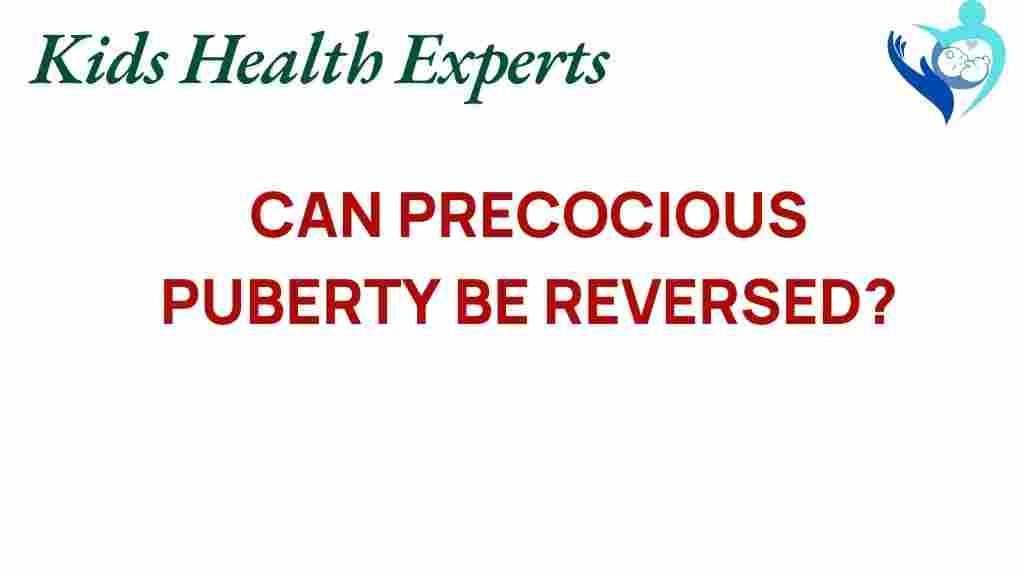Can Precocious Puberty Be Reversed?
Precocious puberty is a condition characterized by the early onset of secondary sexual characteristics in children, typically before the age of 9 in boys and 8 in girls. This phenomenon can be concerning for parents, as it may impact a child’s physical and emotional development. Understanding whether precocious puberty can be reversed involves exploring various treatment options, including hormone therapy, and the psychological implications of early maturation.
Understanding Precocious Puberty
To delve into the possibilities of reversing precocious puberty, it’s essential to first understand its underlying causes and how it affects childhood development. Precocious puberty can stem from a variety of factors, including:
- Endocrine Disorders: These disorders can cause the premature activation of the hypothalamic-pituitary-gonadal (HPG) axis.
- Genetic Factors: Family history may play a role in the likelihood of developing this condition.
- Exposure to Hormones: Certain environmental factors or medications may lead to early puberty.
- Central Precocious Puberty: This is the most common type, where the brain signals the body to start puberty early.
The Impact of Precocious Puberty on Childhood Development
The onset of precocious puberty can have significant effects on a child’s physical and emotional growth. Children experiencing early puberty may face:
- Physical Changes: Rapid growth, development of breasts in girls, and testicular enlargement in boys can lead to a mismatch with their peers.
- Psychological Impact: Early maturation can result in increased anxiety, depression, and social challenges.
Exploring Treatment Options for Precocious Puberty
When considering whether precocious puberty can be reversed, it is crucial to discuss the available treatment options. The primary aim of treatment is to halt the progression of puberty, thereby allowing the child to develop at a more typical rate.
Hormone Therapy as a Treatment Option
One common approach to manage precocious puberty is hormone therapy. This involves the use of medications to block the hormones responsible for the early onset of puberty.
- GnRH Agonists: These medications act on the pituitary gland to suppress the release of hormones that trigger puberty.
- Estrogen and Testosterone Blockers: In some cases, medications may be used to counteract the effects of sex hormones.
Studies have shown that hormone therapy can effectively delay the progression of puberty, allowing children to grow and develop in a more age-appropriate manner. However, the decision to pursue this treatment should be made in consultation with a healthcare professional specializing in endocrine disorders.
Monitoring and Supporting Childhood Development
In addition to medical interventions, ongoing monitoring and support are crucial for children experiencing precocious puberty. This can include:
- Regular Check-ups: Frequent consultations with pediatric endocrinologists to assess growth and development.
- Psychological Support: Counseling or therapy may help children cope with the emotional challenges associated with early puberty.
- Education for Parents: Providing parents with resources and information to better understand their child’s condition.
Psychological Impact of Precocious Puberty
The psychological effects of precocious puberty can be profound. Children may struggle with feelings of isolation, confusion, or embarrassment as they undergo changes that their peers are not experiencing. The following points highlight some of the psychological impacts:
- Social Isolation: Children may feel out of place among peers who are still developing.
- Body Image Issues: Early physical changes can lead to negative self-perception.
- Anxiety and Depression: The stress of early maturation can contribute to mental health challenges.
Addressing these psychological concerns is as important as managing the physical aspects of precocious puberty. Engaging with mental health professionals can provide necessary support.
Step-by-Step Process for Managing Precocious Puberty
If you suspect your child may be experiencing precocious puberty, here is a step-by-step process to follow:
- Observation: Keep track of any signs of early puberty, such as breast development or testicular enlargement.
- Consult a Pediatrician: Schedule an appointment to discuss your observations and concerns.
- Endocrinology Referral: If necessary, your doctor may refer you to a pediatric endocrinologist for further evaluation.
- Diagnostic Testing: Blood tests and imaging studies may be performed to assess hormone levels and growth patterns.
- Discuss Treatment Options: If precocious puberty is diagnosed, discuss the potential benefits and risks of hormone therapy and other treatments with your physician.
- Ongoing Support: Ensure that your child receives both medical and psychological support throughout their development.
Troubleshooting Tips for Parents
Managing precocious puberty can be challenging, but here are some troubleshooting tips for parents:
- Stay Informed: Educate yourself about precocious puberty and its implications.
- Communicate Openly: Talk with your child about their feelings and experiences regarding their development.
- Seek Professional Help: Don’t hesitate to reach out to healthcare providers for guidance and support.
- Connect with Support Groups: Find local or online support groups for parents of children with similar experiences.
For more information on the psychological impact of precocious puberty and resources available, you may find this external resource helpful.
Conclusion
In conclusion, while precocious puberty can be a source of concern for many parents, there are various treatment options available that can help manage the condition. Hormone therapy has shown promise in reversing the physical effects of early maturation, allowing children to develop in a more typical manner. Additionally, addressing the psychological impact is vital to ensure the overall well-being of affected children.
If you suspect your child may be experiencing precocious puberty, it is important to seek professional advice and support. Understanding the condition and exploring treatment options can make a significant difference in your child’s development and emotional health. For further reading on childhood development and related topics, check out our internal link.
This article is in the category Conditions and created by KidsHealthExperts Team
